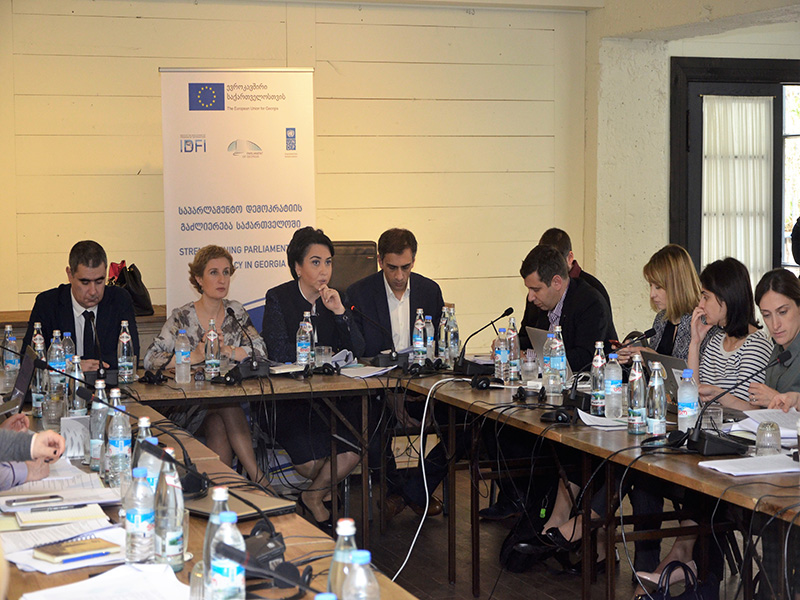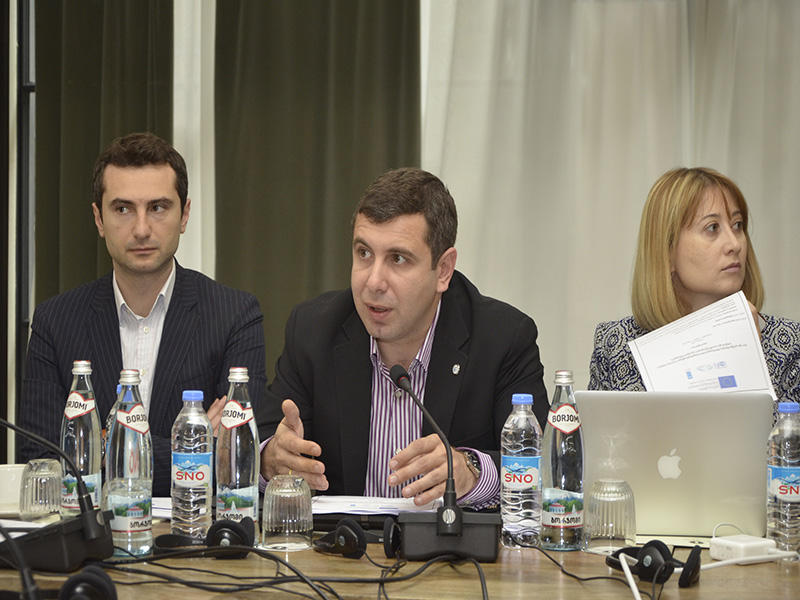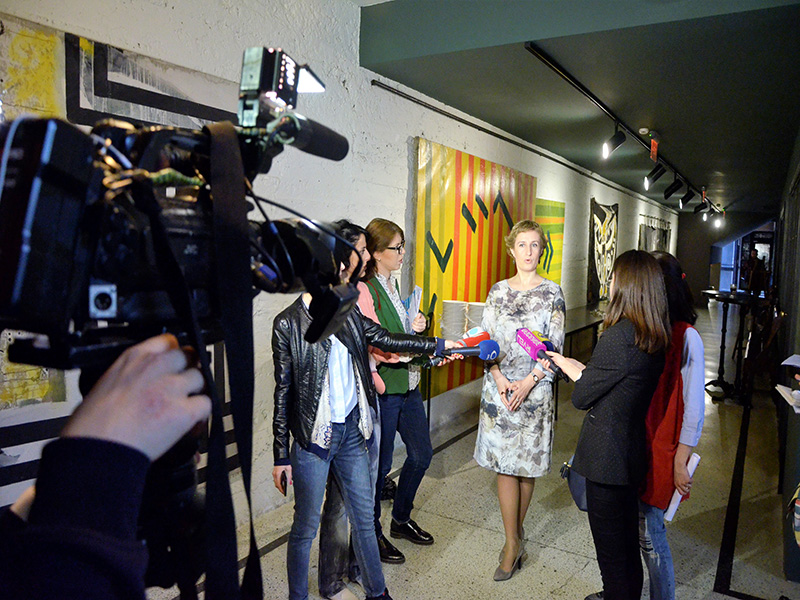


 Author: Natalia Varazi
Author: Natalia Varazi
On May 2, 2017, the Permanent Parliamentary Council on Open and Transparent Governance and its Consultative Group approved the Open Parliament Georgia 2017-2018 Action Plan. The process was supported by European Union (EU) and the United Nations Development Programme (UNDP) in cooperation with IDFI.
In addition to Civil Society Organizations, the meeting was attended by representatives of the Parliament of Georgia, including Irina Pruidze, Chairperson of the Permanent Parliamentary Council on Open and Transparent Governance, Eka Beselia, Chairperson of the Legal Issues Committee of the Parliament, and Kakhaber Kutchava, Chairperson of the Environmental Protection and Natural Resources Committee of the Parliament.
The aim of the Open Parliament Georgia 2017-2018 Action Plan is to ensure accountability and transparency of parliamentary activities and citizen involvement in lawmaking processes. The commitments included in the Action Plan derive from the fundamental principles of Open Government Partnership (Citizen Involvement, Accessibility of Information, Accountability of the Parliament, Transparency of Parliamentary Activities, and Technologies and Innovation). The Action Plan includes 25 commitments that shall be implemented by the Parliament of Georgia in2017-2018.
Action Plan commitments were elaborated by representatives of the Parliament of Georgia, Institute for Development of Freedom of Information (IDFI), Georgian Young Lawyers’ Association (GYLA), Transparency International Georgia (TIG), United Nations Development Program (UNDP), National-Democratic Institute (NDI), Civil Society Institute (CSI), GIZ Georgia, JumpStart Georgia and USAID Good Governance Initiative (GGI).
All 25 commitments are based on the following 5 challenges of OGP:
Challenge 1 – Citizen Involvement:
1.1 Introduction of a public petition system;
1.2 Ensuring citizen involvement in the Constitution review process; 
1.3 Introduction of a mechanism for submission of legislative proposals and legislative initiatives electronically and introduction of a citizen support mechanism through the website of the Parliament of Georgia;
1.4 Elaboration of rules and procedures for public consultations in lawmaking processes, introduction of a feedback mechanism (electronic and/or written comments) on draft laws;
1.5 Adaptation of the building of the Parliament of Georgia to the needs of people with disabilities and ensuring the accessibility of parliamentary services to people with disabilities;
1.6 Raising public awareness on Open Government Partnership;
1.7 Simplification of the procedures for entering the Parliamentary building;
1.8 Elaboration of a state concept on the Development of Civil Society Organizations.
Challenge 2 – Accessibility of Information:
2.1 Increasing the list of information to be proactively published on the Parliament website;
2.2 Introduction of visible indications for amendments made to the initial text of a draft law during its review process, and timely disclosure of these amendments on the Parliament website;
2.3 Proactive disclosure of information on the activities of majoritarian MPs on the Parliament website;
2.4 Timely disclosure of information about Parliamentary hearings of elected officials and reports presented by public institutions accountable to the Parliament, as well as preparation and disclosure of video-reports of relevant committee hearings on the Parliament website;
2.5 Elaboration and proactive disclosure of parliamentary Committees action plans in the beginning of each year.
Challenge 3– Accountability of the Parliament:
3.1 Institutionalization of annual meetings of the Parliament of Georgia and Civil Society Organizations;
3.2 Preparation and disclosure of annual Parliamentary reports;
3.3 Introduction of a self-assessment tool for the Parliament of Georgia.
Challenge 4 – Transparency of Parliamentary Activities:
4.1 Increasing the transparency of investigative and other temporary committees;
4.2 Elaboration of a monitoring system for public information reports (so called “December 10th reports”);
4.3 Elaboration of a Code of Ethics for the Members of the Parliament of Georgia;
4.4 Improving the contents of draft law explanatory notes;
4.5 Introduction of an obligation to substantiate changes to committee hearing agendas;
4.6 Supervision/Monitoring of activities carried out by the Government of Georgia within the framework of Open Government Partnership.
 Challenge 5 – Technologies and Innovation:
Challenge 5 – Technologies and Innovation:
5.1 Improvement of the voting results database;
5.2 Creation of a public information module and simplification of access to information on Parliamentary activities (including disclosure of documents in machine readable formats);
5.3 Restructuration of the Parliament website.
The Open Parliament Georgia 2017-2018 Action Plan is planned to be approved by the Bureau of the Parliament of Georgia in May 2017.